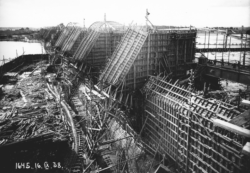Scholars often identify a ‘delay’ in the coverage of the Great Depression in Romania, both in terms of reporting the evolution of the crisis abroad and its impact at home. Indeed, newspapers, officials, and private individuals frequently referred to the crisis as a phenomenon that took place, or was more severe, elsewhere. The memoirs of … Continue reading “From Far Away to Closer to Home: Early Perceptions of the Great Depression in Romania”
Constructing East Central Europe out of the Depression
Across 1930s Europe, governments used work-creation schemes to address the problem of rampant mass unemployment. Most often, these were used to carry out large-scale infrastructural projects. In East Central Europe, these projects also had an important state-building function. All states in this region were either newly created or fundamentally reshaped as a consequence of the … Continue reading “Constructing East Central Europe out of the Depression”
Voices of the Economic Crisis – Farmers in Poland
The Second Polish Republic (1918-1939) was considered a rural country with nearly 65% of its population working in agriculture. Life was not easy for these people in general and when the economic crisis of the 1930s hit Poland it became even worse. In 1933 the Institute of Social Economy [Instytut Gospodarstwa Społecznego] advertised a contest … Continue reading “Voices of the Economic Crisis – Farmers in Poland”
Benefits of the Great Depression? The Ambiguous Case of Urban Workers in Romania
Global economic crises like the Great Depression hit countries at different times, with various intensities, and great local and regional disparities. Some social categories are more affected than others, and the impact of crisis in one sector of the economy may have unexpected effects elsewhere. As part of my preliminary research for the project The … Continue reading “Benefits of the Great Depression? The Ambiguous Case of Urban Workers in Romania”
Economic nationalism in today’s East Central Europe
Under the pressures of the Great Depression, the predominantly agricultural states of interwar East Central Europe resorted to economic policies that were particularly protectionist in character. In an era when international relations were increasingly characterised by hostility and territorial revisionism, many feared that economic weakness could easily lead to a loss of sovereignty, if exploited … Continue reading “Economic nationalism in today’s East Central Europe”
About the project
‘The Liminality of Failing Democracy: East Central Europe during the Interwar Slump’ is a research project funded by the Gerda-Henkel-Stiftung for a duration of three years (2021 – 2024). The project team investigates how the crises of the interwar period, culminating in the Great Depression, transformed societies and states across East Central Europe. East Central … Continue reading “About the project”


